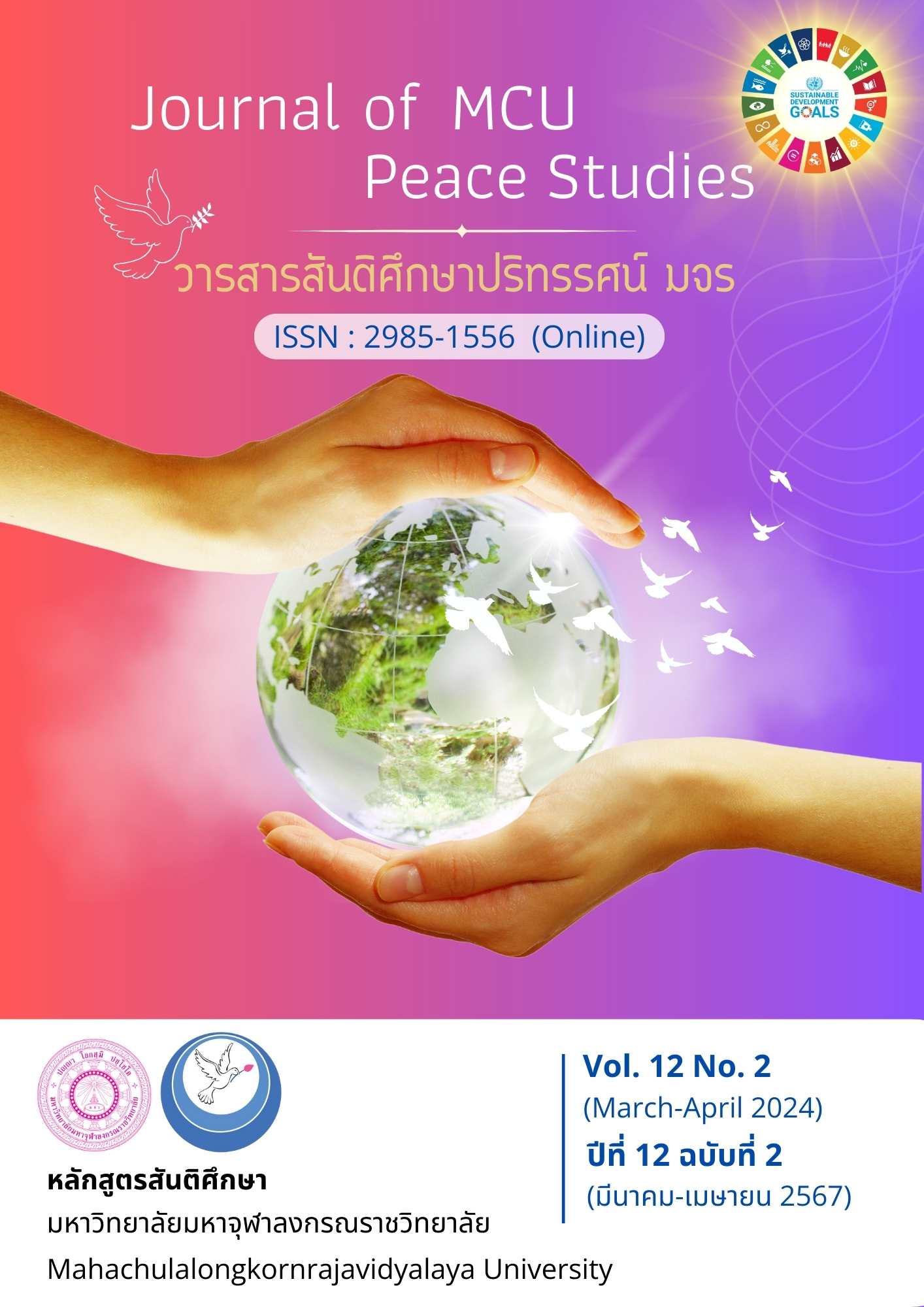Guidelines for Developing the Potential of Farmer Organizations for Sustainable Self-Reliance
Main Article Content
บทคัดย่อ
Farmer organizations serve as vital pillars in advancing and sustaining agricultural practices, particularly in fostering autonomy within farming communities. This mixed research endeavor adopts a comprehensive approach to address the pressing issue of agricultural household indebtedness and evaluate the effectiveness of the Farmer Rehabilitation and Development Project. The study aims to achieve objectives: 1). to scrutinize the status of farmers’ household debt and assess the outcomes of the Farmer Rehabilitation and Development Project; 2). to analyze the data and impacts stemming from the rehabilitation initiative on farmers; and 3). to provide recommendations for enhancing community organizations’ capacity for sustainable self-sufficiency. The quantitative dimension of the study encompasses 3,587 members of farmer associations and stakeholders spanning 77 provinces, with a purposive sample size of 2,788 individuals.
The outcomes portray a worrisome situation, emphasizing a persistent increase in debt levels within Thai farmer associations. However, inherent capabilities are apparent among the farmer collectives, establishing the foundation for possible progress. A total of four main tactics are specified for fostering this potential: 1) Leadership Development: Empowering individuals within farmer groups with the necessary skills and expertise to effectively address challenges. 2) Farmer Group Potential Development: Fostering the inherent potential of farmer groups through capacity development and resource allocation. 3) Social Networking Development: Cultivating strong networks and partnerships to facilitate knowledge sharing, cooperation, and assistance. 4) Development of Modern Information Technology: Embracing technological progress to streamline processes, access markets, and enhance decision-making. As Thailand plans its trajectory for the ensuing two decades, this strategic blueprint acts as a guide, directing policymakers, stakeholders, and farmer communities toward a future characterized by resilience, prosperity, and sustainable agricultural progress.
The quest for sustainable self-reliance in agriculture necessitates a multifaceted approach, as delineated through the objectives of this study. By delving into the realms of household debt, project evaluation, and community organization development, a holistic framework emerges, poised to guide farmer organizations toward sustainable growth and resilience. Through concerted efforts guided by these principles, farmer organizations can emerge as vanguards of agricultural sustainability, empowering farming communities to thrive amidst the challenges of the 21st century.
Article Details

อนุญาตภายใต้เงื่อนไข Creative Commons Attribution-NonCommercial-NoDerivatives 4.0 International License.
ทัศนะและความคิดเห็นที่ปรากฏในบทความในวารสาร ถือเป็นความรับผิดชอบของผู้เขียนบทความนั้น และไม่ถือเป็นทัศนะและความรับผิดชอบของกองบรรณาธิการ ยินยอมว่าบทความเป็นลิขสิทธิ์ของวารสาร
เอกสารอ้างอิง
Aaltonen, W. (2021). Building a Capable Farmers’ Organization towards Livelihood Improvement: Evidence from Three Thai Rice Farmers’ Organizational Models. (Doctoral Dissertation). SOAS University. London.
Abraham, M. et al. (2022). Aggregation Models and Small Farm Commercialization–A Scoping Review of the Global Literature. Food Policy, 110, 102299.
Asim, M. et al. (2024). Sustainable Agriculture and the SDGs: A Convergence Approach. In Sustainable Practices for Agriculture and Marketing Convergence (pp. 1-26). IGI Global.
Chantarasombat, C., & Agsonsua, P. (2021). KM, PAR, Sufficiency Economy Philosophy, Growing and Producing Phak Waan Pah for Self-reliance. Multicultural Education, 7(7), 222-236.
Chantarasombat, C., & Agsonsua, P. (2022). Knowledge Management, PAR, Sufficiency Economy Philosophy and Growing Phak Wan Pah for Self-reliance in Thailand. London Journal of Research in Humanities and Social Sciences, 22(2), 31-54.
Chantarat, S. et al. (2023). Financial Lives and the Vicious Cycle of Debt among Thai Agricultural Households. The Puey Ungphakorn Institute for Economic Research, Discussion Paper No. 204.
Commissioner for Social Reform. (2015). The Concept of Strengthening Communities in the Social Reform Act Creates Citizen Power and Strong Social Power. Retrieved June 23, 2023, from https://mehealthpromotion.com/upload/forum/mebook_FWHN.pdf
Forecast Statistics Division National Statistical Office. (2020). Debt of Farmer Households 2019. Retrieved July 14, 2023, from http://service.nso.go.th/nso/nsopublish/pubs/e-book/Agri_Household_Deb62/157/index.html
Likert, R. A. (1961). New Patterns of Management. New York: McGraw-Hill Book Company Inc.
Office of Agricultural Economics Ministry of Agriculture and Cooperatives. (2022). Number of Farmers, Proportion of Households Separated by Activity Groups. Retrieved August 8, 2023, from https://data.moac.go.th/?p=farmer
Office of the Farmers Development and Rehabilitation Fund. (2018). Farmer's Debt Remedial Project Manual, Member of the Sustainable Farmers Development and Rehabilitation Fund. Bangkok: Office of the Farmer's Rehabilitation and Development Fund.
Office of the Farmers Development and Rehabilitation Fund. (2019). Annual Report 2018. Bangkok: Office of the Farmers Development and Rehabilitation Fund.
Office of the Farmers Rehabilitation and Development Fund. (2020). 4-Year Strategy, Office of the Farmers Recovery and Development Fund (2020 - 2024). Retrieved August 8, 2023, from https://frdfund.org/th/wp-content/uploads/2021/02/81.2563-2567-edit-24-2-64.pdf
Office of the National Economic and Social Development Council. (2018). Thailand’s 20-Year National Strategy (2018-2037). Retrieved July 23, 2023, from http://nscr.nesdc.go.th/wp-content/uploads/2023/06/NS_SumPlanOct2018.pdf
Office of the Permanent Secretary, Ministry of Commerce (2020). Price of agricultural crops in 2019. Retrieved July 23, 2023, from https://www.oae.go.th/assets/portals/1/files/journal/2020/yearbook62edit.pdf
Prabripu, P. (2023). Sustainability of Small Farming Households: An Outcome of their Being a Sufficiency Economy Unit. Journal of Applied Economics and Management Strategy, 10(1), 222-238.
Promkhambut, A. et al. (2023). Rethinking Agrarian Transition in Southeast Asia through Rice Farming in Thailand. World Development, 169, 106309.
Ratanavararak, L., & Chantarat, S. (2022). Do Agricultural Debt Moratoriums Help or Hurt? The Heterogenous Impacts on Rural Households in Thailand (No. 195). Puey Ungphakorn Institute for Economic Research.
Rodthong, W. et al. (2020). Factors Influencing the Intensity of Adoption of the Roundtable on Sustainable Palm Oil Practices by Smallholder Farmers in Thailand. Environmental Management, 66, 377-394.
Sathapatyanon, J. et al. (2018). The Role of Farmer Organizations and Networks in the Rice Supply Chain in Thailand. Journal of Agribusiness in Developing and Emerging Economies, 8(3), 554-578.
Tansuchat, R. et al. (2022). Impacts of COVID-19 on Sustainable Agriculture Value Chain Development in Thailand and ASEAN. Sustainability, 14(20), 12985.
Thailand Development Research Institute Foundation. (2015). Farmer Debt Study Project and Potential Improvement Guidelines. Fund Operations under the Supervision of the Ministry of Agriculture and Cooperatives, Office of Agricultural Economics.
United Nations. (n.d.). Sustainable Development Goals. Retrieved June 15, 2023, from https://sdgs.un.org/
Wang, K. C. (2024). Struggling for Access in the Global Era: The Cases of Edamame and Rice Agriculture in Rural Thailand. Food, Culture & Society, 1-21.
Yalegama, S., Chileshe, N., & Ma, T. (2016). Critical Success Factors for Community-driven Development Projects: A Sri Lankan Community Perspective. International Journal of Project Management, 34(4), 643-659.


